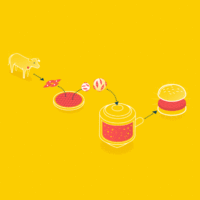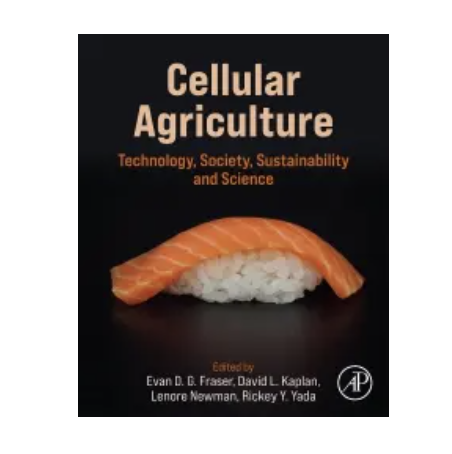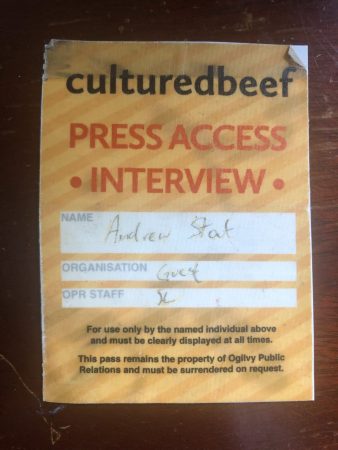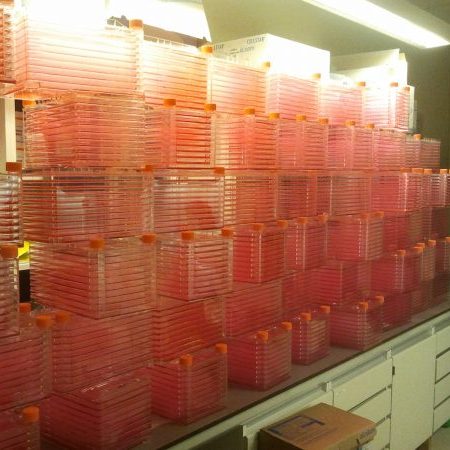- Overview
- Background
- Behind-the-scenes
Overview
Back in the early 2000s, cultured meat was considered science fiction. As the world's only cultured meat organization at the time, our work boiled down to: How do we get the world to take cultured meat seriously as an idea worth pursuing?
Between 2004 and 2013, Harvest was involved in a series of initiatives that ultimately culminated in a historic tasting of the world’s first cell-cultured burger, developed by Mark Post at the University of Maastricht. This burger, cooked and tasted on live television, proved to the world that cultured meat is scientifically possible.
The 2013 burger tasting directed unprecedented media attention to the concept of cultured meat, providing a necessary proof of concept for future funding and the formation of companies.
In 2015, New Harvest granted Mark Post’s lab $50,000 for serum-free media research to develop a completely animal-free system for growing cultured meat.
In 2016, Mark Post co-founded Mosa Meat. Inspired by their time in the lab during the burger development, two of Mark Post’s students went on to launch their own careers in cellular agriculture.15
15Andrew Stout, a visiting undergraduate student in Mark Post’s lab during the burger creation, became a New Harvest Research Fellow in 2017. Daan Luining, a master’s degree candidate in Mark Post’s lab, interned at New Harvest and then founded his own cultured meat company, Meatable, in 2018.
Behind-the-scenes
- Nametag from the London tasting of the world’s first cell-cultured burger. (Photo by Andrew Stout)
- Ten-layer tissue culture flasks from Mark Post’s lab used for making just a portion of the cell-cultured hamburger. The entire patty took many more culture flasks than what is shown here. (Photo by Daan Luining)
Updates
November, 2015 – New Harvest publishes a blog post about the research leading up to the 2013 burger.
Winter, 2015 – New Harvest grants Mark Post’s lab $50,000 for serum-free media research to develop a completely animal-free system for growing cultured meat.
August, 2013 – The world’s first cell-cultured burger is cooked and tasted live on BBC, proving to the world that cultured meat is scientifically possible. The burger is developed by Mark Post and funded by Sergey Brin.
2010 – Google co-founder Sergey Brin’s family foundation reaches out to New Harvest asking which labs to support in order to advance cultured meat. We direct the foundation to Mark Post.
2007 – New Harvest grants $7,000 to Henk Haagsman, the principal grant writer for the Dutch In Vitro Meat Project. Included among the other team members in the project is Mark Post, who eventually develops the 2013 burger.
October, 2004 – New Harvest founder Jason Matheny speaks with the Dutch Minister of Agriculture about cultured meat. This conversation plays a key role in inspiring the Dutch government to fund the Dutch In Vitro Meat project from May 2005 until April 2009.
See More Initiatives

Artificial Intelligence and Machine Learning in Cellular Agriculture
Cost and scale are major blockers to cellular agriculture's success, but they are complex technical and economic challenges. Artificial intelligence (AI) and machine learning (ML) techniques could help to accelerate much of this work, but there is very little public literature on the various applications and benefits. Given the potential exponential impact of AI/ML, New Harvest and Alberta Machine Intelligence Institute (Amii) launched the AI in Cell Ag Initiative.

Safety Initiative Phase III: Precompetitive Collaboration on Safety Research and Methods Development
The Cultured Meat Safety Initiative (CMSI) is a joint initiative between New Harvest and Vireo Advisors aiming to address critical technical, methodological, and informational challenges related to evaluating the safety of cultured meat (CM) products.
CMSI involves the convening of diverse stakeholders, including industry, governmental scientists, regulators, academic researchers, and others. Gaining such varied perspectives advances public knowledge and the practice of food safety for CM products by identifying and addressing data gaps. Research conducted to develop data and methods build the necessary support elements for the emerging ecosystem, which can raise regulatory and consumer confidence, support industry efforts toward commercialization, and improve the efficacy of evaluation processes of regulatory safety reviews.
Building on progress from Phase I and Phase II of CMSI, New Harvest and Vireo Advisors are now working to convene diverse stakeholders to create the infrastructure for shared knowledge, methods, and data that address the priorities identified in Phase I and II. Our long-term goal is to coordinate and launch regional efforts to develop and validate analytical methods for CM safety analysis and use these methods to generate datasets that can be made publicly available to support transparent food risk assessments and policy-making processes.

The Foundational Cellular Agriculture Textbook
Cellular Agriculture: Technology, Society, Sustainability and Science was designed to be the go-to reference for everyone in cellular agriculture - the textbook found in every company’s office, in every university lab, and in every aspiring student’s backpack.
The text provides a state-of-the-art review of cellular agriculture technologies, presenting foundational information with practical application insights. There are chapters on regulatory and policy issues, as well as reviews of the sustainability challenges of alternative proteins.
It is the first resource of its kind to take a practical approach to review the design, feasibility, and implementation of cellular agriculture techniques. With additional chapters on life cycle analyses and ideal transition scenarios, this book provides a resource for aspiring technology developers and academics alike seeking evidence-based assessments of the industry and its disruptive potential. The textbook was written by industry and academic experts for a balanced perspective of the field today and to inspire and shed light on a path forward.



